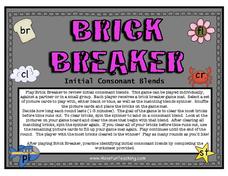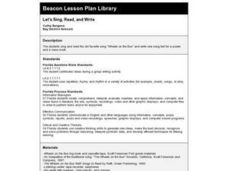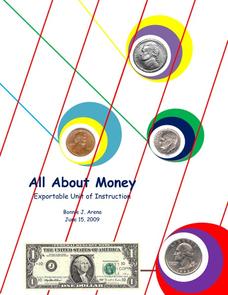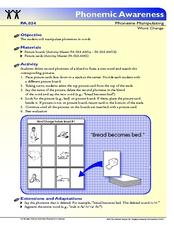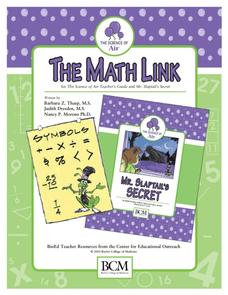Museum of Disability
Don't Call Me Special
Introduce young learners to the idea of disabilities and making friends with children who are different than they are. Using Don't Call Me Special - A First Look at Disability by Pat Thomas, learners are guided through the new...
Curated OER
Marking Time
Two narrative excerpts tell the same story from different points of view. In the first excerpt (first person), sequencing words and phrases are bolded and learners write down what the bold type does. The second excerpt is in third...
Curated OER
Book Nook
A reading of Dr. Seuss's My Many Colored Days provides a great intro for a discussion of colors and how they can represent emotions and moods. Kids share the feelings they associate with various colors
Achieve3000
Discriminating Phonemes
Develop the fluency of beginning readers one sound at a time with this phonemic awareness lesson. Through a series of whole-class instruction, independent practice, and collaborative learning activities, children practice...
Curated OER
Practice Reading an Ad
In this ad worksheet, students read an ad about sports day, answer multiple choice questions, short answer questions, and fill in the blanks to sentences. Students complete 3 activities.
Curated OER
Construction Starts on Freedom Tower
Students are introduced to an image of Freedom Tower, then read a news article about the construction of this building that will be completed in 2011. In this current events lesson, the teacher introduces the article with an...
Curated OER
What We Are Doing in Our Literacy Center
In this literacy center worksheet, students read 7 goals which have been set for the literacy center. It is unclear what facility the worksheet refers to.
Florida Center for Reading Research
Vocabulary: Morphic Elements, Compound Word Trivia
Engage young learners in expanding their vocabulary with a fun game. Scholars learn how compound words provide clues about the meaning of unfamiliar vocabulary. Pairs take turns reading a definition, locating its corresponding compound...
Texas Center for Learning Disabilities
Second-Grade Explicit Intervention
Unfortunately, not all students learn to read at the same pace, but with the help of this resource, you can ensure that they all receive the support they need to reach this important goal. Comprised of short...
National Center for Families Learning
The Summer Fun Summer Learning Poetry Unit
Focus on poetry this summer to enhance those comprehension, fluency, and language skills with a set of resources intended to explore different types of poetry, specifically lyric poetry. The daily activities contain differentiation ideas...
A to Z Teacher Stuff
Solar System Book
Young astronomers travel through the solar system in the pages of this printable book. With clear pictures and simple sentence structure, this is a perfect resource for exploring the planets in the early elementary grade levels.
Curriculum Corner
Inferencing
Inferencing is a necessary reading skill to uncover non-explicit messages in text. Use the set of resources as a way to guide learners toward becoming expert inferrers through reading prompts and literature with text and without text.
Have Fun Teaching
Brick Breaker: Initial Consonant Blends
Practice initial consonant blends with a fun, interactive game! Choose the sounds you'd like to practice, and then have kids place the appropriate pictures for their brick breaker boards. Spin the spinner to select a blended sound, and...
Reading Resource
Bubble Letters
A fun way to display the alphabet in your classroom! Each letter of the alphabet is featured on a full-page piece of paper, ready for decoration or use as a learning tool.
Curated OER
Let's Sing, Read, and Write
Students sing and read the old favorite song Wheels on the Bus, and write new song text for a poster and a class book.
Curated OER
All About Money
Few topics engage young mathematicians as much as learning about money. Through a series of shared readings and hands-on activities, children explore the US currency system, learning how to count money and calculate change as they create...
Florida Center for Reading Research
Phonological Awareness: Phoneme Manipulating, What's Left?
Scholars subtract initial phonemes from given picture word cards to create new words. Feet becomes eat, and shelf becomes elf.
Florida Center for Reading Research
Vocabulary: Morphemic Elements, Root-A-Word
In pairs, scholars draw cards, read the word, and identify its root. Learners place the card on a tree-themed worksheet to sort words by their roots.
Florida Center for Reading Research
Phonological Awareness: Phoneme Matching, Final Phoneme Pie
Words are interesting things—you can change them by adding or subtracting phonemes. Here, emergent readers change the pictures on their phoneme pie by removing or adding various final phonemes. A fun way to build phonetic competency!
Florida Center for Reading Research
Phonological Awareness: Phoneme Manipulating, Word Change
Once your scholars know their letter sounds and recognize them in words, have them try making new words by manipulating phonemes. Pupils are given a word change picture board and a stack of word pictures. They pick a card and place it...
Florida Center for Reading Research
Phonemic Awareness: Phoneme Segmenting, The Phoneme Game
Early readers play a board game to practice segmenting phonemes. Players determine how many spaces to move by choosing a picture, saying the object's name on the card, then counting the phonemes they say.
Baylor College
Air: The Math Link
Inflate this unit on the science of air with these math skills practice and word problems. Accompanying the children's story Mr. Slaptail's Secret, this resource covers a wide range of math topics including the four basic...
Curated OER
Activity Guide for Snow
Create a cross-curricular learning experience around a shared reading of Cynthia Rylant's book Snow. From writing poetry and a singing a song about snow, to creating paper snowflakes and solving math story problems, this resource...
Smithsonian Institution
Water/Ways: The Poetry of Science
Water is the source of life. It appears in poetry in both peaceful and torrential descriptions; it appears in earth science in its liquid, gaseous, and solid states. Combine these interpretations of our planet's most precious and...
Other popular searches
- Context Clue Reading Centers
- Hands on Centers Reading
- Guided Reading Centers
- Constitution Reading Centers
- 2nd Grade Reading Centers
- Kindergarten Reading Centers
- Mangement of Reading Centers
- Constituiton Reading Centers
- Management of Reading Centers
- Centers for Reading














